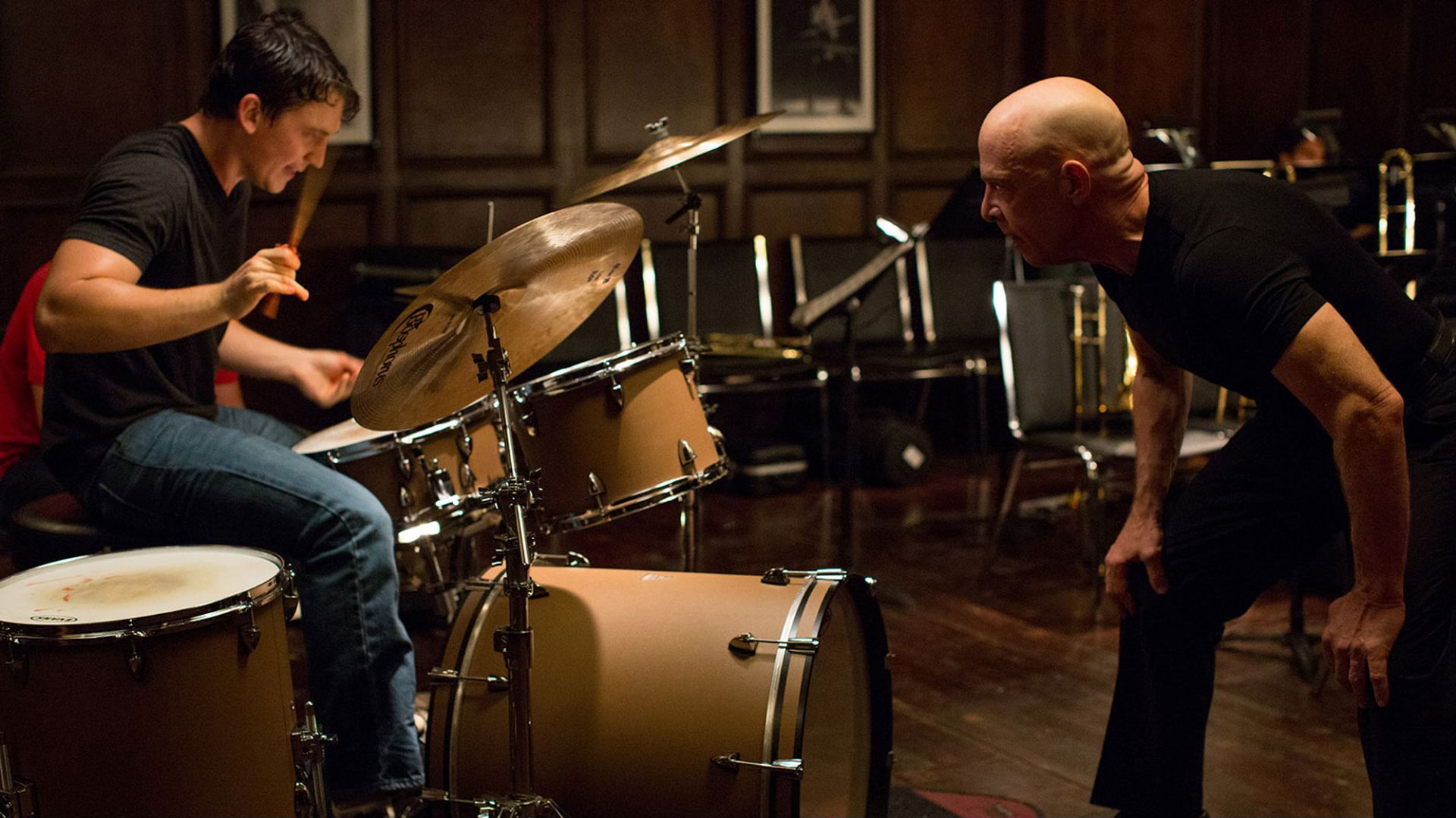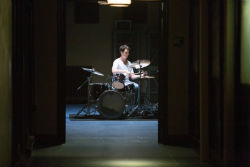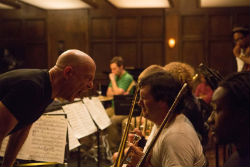One of the reasons why jazz is often considered a uniquely American art form is the way that it straddles the line between individual glory and collective responsibility. A jazz band is only as good as the sum of its parts, each member playing a role and keeping the right tempo.
 Daniel McFadden / Sony Pictures
Daniel McFadden / Sony PicturesAnd yet jazz builds in space for individuals to improvise and claim the solo spotlight. It’s an art form that values freedom and wildness, but within bounds; pitch, meter, tempo and technique still matter. It’s the tension between order and chaos. Jazz is very much about bringing order out of chaos, as all art is; yet it’s also about riffing on chaos. Born as it was in the transition years between Victorian-era orderliness and the fragmenting deconstruction of modernism, jazz finds beauty in the blurry space between order/meter and disorderly life.
Whiplash, written and directed by 29-year-old Damien Chazelle, is a film about jazz that reflects these tensions well. It follows Andrew Neiman (Miles Teller), a gifted jazz drummer aspiring to greatness while studying under an intense teacher named Terence Fletcher (J.K. Simmons) at a fictional, Juilliard-esque music school in New York City. Fletcher is kind of like the Professor Snape of college jazz band teachers. He hurls insults (and sometimes chairs) at his students and often makes them cry. He shames, manipulates, and emotionally abuses his pupils, all with the vocabulary of a sailor skilled in stringing together profanities in creative ways.
Like Snape, Fletcher directs extra measures of wrath on the pupil with the most promise. Andrew is his Harry Potter. And while they are enemies for much of the film, they also need each other. Fletcher’s relentless whip-cracking and apparent villainy turns out to be just the sort of tough-love discipline Andrew needs to make the most of his gifts.
One of the things Whiplash is about is the necessity of discipline and accountability in a world where kids grow up—emboldened by shelves of participation trophies and constant “you can do anything!” pats on the back—thinking world-changing greatness is just a Kickstarter campaign away. It’s a world where many aspiring artists, including many Christians, skip that whole “tireless, decades-long training to master the craft” part, jumping straight to making the “masterpiece” that they are then surprised to see get trashed by the critics.
No, in order to be a legend, in order to make a difference as an artist, one must accept the indispensability of mastering technique. In order to be a good improviser, one must first excel within limits. Prior to “breaking the rules” in a brilliant and influential way, artists must study the greats and be great. Before Jackson Pollock was in a position to convince anyone of the excellence of his abstract expressionism, he had to first train in representational technique (he did in part under Thomas Hart Benton). Terrence Malick could have never made a formally bonkers film like To the Wonder had he not first established his credibility with more traditional fare like Badlands.
So it is for young Andrew under the tutelage of Fletcher, a man who maintains that the most harmful two words in the English language are “good job.” Andrew is brought to literal blood, sweat and tears repeatedly in the film, as the Hegelian collision between his drive and Fletcher’s punishing temper gradually produces something brilliant. Andrew’s father (Paul Reiser) is nurturing and outwardly loving; he’s there to hug his son when a concert performance doesn’t go so well.
But Fletcher provides something fatherly that Andrew desperately needs: discipline. One minute Fletcher encourages Andrew and the next he’s slapping him in the face. One minute Andrew is Fletcher’s go-to drummer and the next he’s kicked out of the band. But it’s not bipolar as much as it’s two faces of the same love—a love that includes both grace and discipline, both mercy and judgment. When Andrew comes to realize this, he may as well be reading Hebrews 12:5-6: “My son, do not regard lightly the discipline of the Lord, nor be weary when reproved by him. For the Lord disciplines the one he loves, and chastises every son whom he receives.”
True growth requires limits, chastisement, listening to the hard truth—not just hugs and pats on the back. And yet growth often happens in fits and starts; three steps forward, two steps back. Whiplash gets its title from a prominent song in the film but also from its own stop-and-start time signature. The characters in the film experience alternating highs and lows, moments of loud rage and quiet reflection. Tempo changes and modulations happen frequently in span of a single scene. Characters’ emotions and temperaments toward one another fluctuate just as wildly. Whiplash indeed.
 Daniel McFadden / Sony Pictures
Daniel McFadden / Sony PicturesThe film’s form reflects its content, with jazz-like bursts of quick cuts and intense montage balanced with quieter, slower moments and longer takes. Musically, the film teases us with short, wonderful bursts of jazz performance (and especially drumming) for most of its running time, keeping true to the start-stop-start motif. Only in the film’s final scene do we get an extended, uninterrupted performance, and it’s breathtaking. The final concert scene reminded me of the final scene of Roman Polanski’s The Pianist (2002), which felt similarly cathartic and almost transcendent.
Miles Teller and J.K. Simmons are both phenomenal in their parts, playing off each other as brilliantly as one horn to another in a jazz ensemble. Both should receive Oscar nominations, as should the film itself, which won the audience and grand jury prizes at this year’s Sundance Film Festival.
In a film of many standout moments, one that lingers is a rare scene of emotional vulnerability for the otherwise impenetrable Fletcher. He pauses a class session with his jazz ensemble to play a song that reminds him of a former student, who he’d just learned died in a car accident. Fighting back tears, he describes how the former student was the best he’d ever taught and had been rising the ranks in the jazz world when he died. The somber scene captures a sense in the film that artistic brilliance is a fleeting thing—stars burning brightly, but briefly, before they’re gone. Andrew himself admits that he’d rather die young but be remembered as a great (Charlie Parker great, perhaps) than live to be 90 but only have family members remember him. Certainly the intensity with which Andrew throws himself into his aspirations could cause him an early demise. It almost does at one point in the film.
Whiplash raises familiar questions about art and the personal costs of striving for greatness. Kurt Cobain, Heath Ledger, Janis Joplin, David Foster Wallace and a hundred others we could list right now are all testimony to the costs that come with giving one’s life to an artistic pursuit. But does it have to be this way? Must serious, game-changing artists sacrifice things like healthy interpersonal relationships and domestic stability?
Andrew seems to think so. He has no friends and doesn’t seem to care for his family or even the girl who catches his eye (Melissa Benoist). For him, attachments get in the way. The only person he really connects with in the film is Fletcher, and then only because he sees in him the same wild-eyed, reckless passion for jazz that he himself has.
 Daniel McFadden / Sony Pictures
Daniel McFadden / Sony PicturesThe film made me think of a famous passage in Jack Kerouac’s On the Road, itself a jazz-inspired narrative: “The only people for me are the mad ones, the ones who are mad to live, mad to talk, mad to be saved, desirous of everything at the same time, the ones who never yawn or say a commonplace thing, but burn, burn, burn like fabulous yellow Roman candles exploding like spiders across the stars . . . ”
What’s so wrong with occasional yawns or “commonplace” things? Isn’t there something to be said for the mundane structures and foundations of life that provide order and safe parameters for the Roman candle explosions? Indeed, as we’ve already seen, jazz itself isn’t pure madness but rather ordered chaos, energy channeled through and working within rhythmic, tonal, dynamic boundaries. So it is with any art or passion we might pursue. Whiplash happens when we pit our rocket ambitions in opposition to the sturdiness and steadiness of foundations, when the reality is true flourishing needs both.
Caveat Spectator
Whiplash is rated R for language, and oh boy does it deserve it. The Fletcher character spews out profanities and mean-spirited sexual references like it’s his job (he thinks that it is), and the other characters occasionally fire back. The language in the jazz band practice room could easily contend with a football practice field or military bootcamp for the title of most profane training environment. Filmgoers with low tolerance for profane language should probably avoid this film. In addition to language the film has a very visceral intensity that includes a good bit of bloody hands (from frenzied drumming) and one fairly violent car accident scene. Let’s just say images of blood dripping on a snare drum is one of the film’s most recurring motifs. The “blood, sweat, and tears” mantra of hard work is very literally expressed in the film.
Brett McCracken is a Los Angeles-based writer and journalist, and author of the booksHipster Christianity: When Church and Cool Collide (Baker, 2010) and Gray Matters: Navigating the Space Between Legalism and Liberty (Baker, 2013). You can follow him@brettmccracken.












